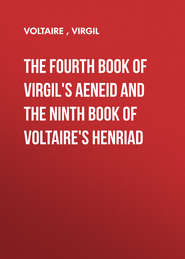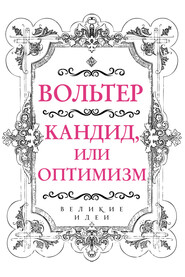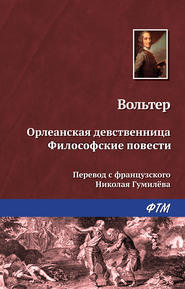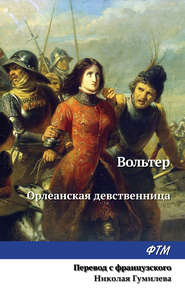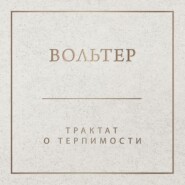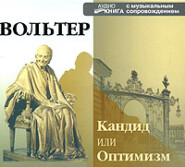По всем вопросам обращайтесь на: info@litportal.ru
(©) 2003-2024.
✖
A Philosophical Dictionary, Volume 01
Настройки чтения
Размер шрифта
Высота строк
Поля
A Philosophical Dictionary, Volume 01
Voltaire
François-Marie Arouet (AKA Voltaire)
A Philosophical Dictionary, Volume 01
A
The letter A has been accounted sacred in almost every nation, because it was the first letter. The Egyptians added this to their numberless superstitions; hence it was that the Greeks of Alexandria called it hier'alpha; and, as omega was the last of the letters, these words alpha and omega signified the beginning and the end of all things. This was the origin of the cabalistic art, and of more than one mysterious folly.
The letters served as ciphers, and to express musical notes. Judge what an infinity of useful knowledge must thus have been produced. A, b, c, d, e, f, g, were the seven heavens; the harmony of the celestial spheres was composed of the seven first letters; and an acrostic accounted for everything among the ever venerable Ancients.
A, B, C, OR ALPHABET
Why has not the alphabet a name in any European language? Alphabet signifies nothing more than A, B, and A, B, signifies nothing, or but indicates two sounds, which two sounds have no relation to each other. Beta is not formed from alpha; one is first, the other is second, and no one knows why.
How can it have happened that terms are still wanting to express the portal of all the sciences? The knowledge of numbers, the art of numeration, is not called the one-two; yet the first rudiment of the art of expressing our thoughts has not in all Europe obtained a proper designation.
The alphabet is the first part of grammar; perhaps those who are acquainted with Arabic, of which I have not the slightest notion, can inform me whether that language, which is said to contain no fewer than eighty words to express a horse, has one which signifies the alphabet.
I protest that I know no more of Chinese than of Arabic, but I have read, in a small Chinese vocabulary, that this nation has always had two words to express the catalogue or list of the characters of its language: one is ko-tou, the other hai-pien; we have neither ko-tou nor hai-pien in our Occidental tongues. The Greeks, who were no more adroit than ourselves, also said alphabet. Seneca, the philosopher, used the Greek phrase to designate an old man who, like me, asks questions on grammar, calling him Skedon analphabetos. Now the Greeks had this same alphabet from the Phœnicians – from that people called the letter nation by the Hebrews themselves, when the latter, at so late a period, went to settle in their neighborhood.
It may well be supposed that the Phœnicians, by communicating their characters to the Greeks, rendered them a great service in delivering them from the embarrassment occasioned by the Egyptian mode of writing taught them by Cecrops. The Phœnicians, in the capacity of merchants, sought to make everything easy of comprehension; while the Egyptians, in their capacity of interpreters of the gods, strove to make everything difficult.
I can imagine I hear a Phœnician merchant landed in Achaia saying to a Greek correspondent: "Our characters are not only easy to write, and communicate the thoughts as well as the sound of the voice; they also express our respective debts. My aleph, which you choose to pronounce alpha, stands for an ounce of silver, beta for two ounces, tau for a hundred, sigma for two hundred. I owe you two hundred ounces; I pay you a tau, and still owe you another tau; thus we shall soon make our reckoning."
It was most probably by mutual traffic which administered to their wants, that society was first established among men; and it is necessary that those between whom commerce is carried on should understand one another.
The Egyptians did not apply themselves to commerce until a very late period; they had a horror of the sea; it was their Typhon. The Tyrians, on the contrary, were navigators from time immemorial; they brought together those nations which Nature had separated, and repaired those calamities into which the revolutions of the world frequently plunged a large portion of mankind. The Greeks, in their turn, carried to other nations their commerce and their convenient alphabet, which latter was altered a little, as the Greeks had altered that of the Tyrians. When their merchants, who were afterwards made demi-gods, went to Colchis to establish a trade in sheepskins – whence we have the fable of the golden fleece– they communicated their letters to the people of the country, who still retain them with some alteration. They have not adopted the alphabet of the Turks, to whom they are at present subject, but whose yoke, thanks to the Empress of Russia, I hope they will throw off.
It is very likely (I do not say it is certain – God forbid!) that neither Tyre nor Egypt, nor any other country situated near the Mediterranean Sea, communicated its alphabet to the nations of Eastern Asia. If, for example, the Tyrians, or the Chaldæans, who dwelt near the Euphrates, had communicated their method to the Chinese, some traces of it would have remained; we should have had the signs of the twenty-two, twenty-three, or twenty-four letters, whereas they have a sign for each word in their language; and the number of their words, we are told, is eighty thousand. This method has nothing in common with that of Tyre; it is seventy-nine thousand nine hundred and seventy-six times more learned and more embarrassing than our own. Besides this prodigious difference, they write from the top to the bottom of the page; while the Tyrians and the Chaldæans wrote from right to left, and the Greeks, like ourselves, wrote from left to right.
Examine the Tartar, the Hindoo, the Siamese, the Japanese characters; you will not find the least resemblance to the Greek or the Phœnician alphabet.
Yet all these nations, and not these alone, but even the Hottentots and Kaffirs, pronounce the vowels and consonants as we do, because the larynx in them is essentially the same as in us – just as the throat of the rudest boor is made like that of the finest opera-singer, the difference, which makes of one a rough, discordant, insupportable bass, and of the other a voice sweeter than the nightingale's, being imperceptible to the most acute anatomist; or, as the brain of a fool is for all the world like the brain of a great genius.
When we said that the Tyrian merchants taught the Greeks their A, B, C, we did not pretend that they also taught them to speak. It is probable that the Athenians already expressed themselves in a better manner than the people of Lower Syria; their throats were more flexible, and their words were a more happy assemblage of vowels, consonants, and diphthongs. The language of the Phœnician people was rude and gross, consisting of such words as Shasiroth, Ashtaroth, Shabaoth, Chotiket, Thopheth, etc. – enough to terrify a songstress from the opera of Naples. Suppose that the Romans of the present day had retained the ancient Etrurian alphabet, and some Dutch traders brought them that which they now use; the Romans would do very well to receive their characters, but it is not at all likely that they would speak the Batavian language. Just so would the people of Athens deal with the sailors of Capthor, who had come from Tyre or Baireuth; they would adopt their alphabet as being better than that of Misraim or Egypt, but would reject their speech.
Philosophically speaking, and setting aside all inferences to be drawn from the Holy Scriptures, which certainly are not here the subject of discussion, is not the primitive language a truly laughable chimera?
What would be thought of a man who should seek to discover what had been the primitive cry of all animals; and how it happens that, after a series of ages, sheep bleat, cats mew, doves coo, linnets whistle? They understand one another perfectly in their respective idioms, and much better than we do. Every species has its language; that of the Esquimaux was never that of Peru; there has no more been a primitive language or a primitive alphabet than there have been primitive oaks or primitive grass.
Several rabbis assert that the Samaritan was the original tongue; other persons say that it was that of Lower Brittany. We may surely, without offending either the people of Brittany or those of Samaria, admit no original tongue.
May we not, also, without offending any one, suppose that the alphabet originated in cries and exclamations? Infants of themselves articulate one sound when an object catches their attention, another when they laugh, and a third when they are whipped, which they ought not to be.
As for the two little boys whom the Egyptian king Psammeticus– which, by the by, is not an Egyptian word – brought up, in order to know what was the primitive language, it seems hardly possible that they should both have cried bee bee when they wanted their breakfast.
From exclamations formed by vowels as natural to children as croaking is to frogs, the transition to a complete alphabet is not so great as it may be thought. A mother must always have said to her child the equivalent of come, go, take, leave, hush! etc. These words represent nothing; they describe nothing; but a gesture makes them intelligible.
From these shapeless rudiments we have, it is true, an immense distance to travel before we arrive at syntax. It is almost terrifying to contemplate that from the simple word come, we have arrived at such sentences as the following: Mother, I should have come with pleasure, and should have obeyed your commands, which are ever dear to me, if I had not, when running towards you, fallen backwards, which caused a thorn to run into my left leg.
It appears to my astonished imagination that it must have required ages to adjust this sentence, and ages more to put it into language. Here we might tell, or endeavor to tell, the reader how such words are expressed and pronounced in every language of the earth, as father, mother, land, water, day, night, eating, drinking, etc., but we must, as much as possible, avoid appearing ridiculous.
The alphabetical characters, denoting at once the names of things, their number, and the dates of events, the ideas of men, soon became mysteries even to those who had invented the signs. The Chaldæans, the Syrians, and the Egyptians attributed something divine to the combination of the letters and the manner of pronouncing them. They believed that names had a force – a virtue – independently of the things which they represented; they went so far as to pretend that the word which signified power was powerful in itself; that which expressed an angel was angelic, and that which gave the idea of God was divine. The science of numbers naturally became a part of necromancy, and no magical operation could be performed without the letters of the alphabet.
Thus the clue to all knowledge led to every error. The magi of every country used it to conduct themselves into the labyrinth which they had constructed, and which the rest of mankind were not permitted to enter. The manner of pronouncing vowels and consonants became the most profound of mysteries, and often the most terrible. There was, among the Syrians and Egyptians, a manner of pronouncing Jehovah which would cause a man to fall dead.
St. Clement of Alexandria relates that Moses killed a king of Egypt on the spot by sounding this name in his ear, after which he brought him to life again by pronouncing the same word. St. Clement is very exact; he cites the author, the learned Artapanus. Who can impeach the testimony of Artapanus?
Nothing tended more to retard the progress of the human mind that this profound science of error which sprung up among the Asiatics with the origin of truth. The universe was brutalized by the very art that should have enlightened it. Of this we have great examples in Origen, Clement of Alexandria, Tertullian, etc.
Origen, in particular, expressly says: "If, when invoking God, or swearing by him, you call him the God of Abraham, Isaac, and Jacob you will, by these words, do things the nature and force of which are such that the evil spirits submit to those who pronounce them; but if you call him by another name as God of the roaring sea, etc., no effort will be produced. The name of Israel rendered in Greek will work nothing; but pronounce it in Hebrew with the other words required, and you will effect the conjuration."
The same Origen had these remarkable words: "There are names which are powerful from their own nature. Such are those used by the sages of Egypt, the magi of Persia, and the Brahmins of India. What is called magic is not a vain and chimerical art, as the Stoics and Epicureans pretend. The name Sabaoth and Adonai were not made for created beings, but belong to a mysterious theology which has reference to the creator; hence the virtue of these names when they are arranged and pronounced according to rule," etc.
It was by pronouncing letters according to the magical method, that the moon was made to descend to the earth. Virgil must be pardoned for having faith in this nonsense, and speaking of it seriously in his eighth eclogue:
Carmina de cœlo possunt de duecere lunam.
Pale Phœbe, drawn by verse, from heaven descends.
– DRYDEN'S VIRGIL.
In short, the alphabet was the origin, of all man's knowledge, and of all his errors.
ABBÉ
The word abbé, let it be remembered, signifies father. If you become one you render a service to the state; you doubtless perform the best work that a man can perform; you give birth to a thinking being: in this action there is something divine. But if you are only Monsieur l'Abbé because you have had your head shaved, wear a small collar, and a short cloak, and are waiting for a fat benefice, you do not deserve the name of abbé.
The ancient monks gave this name to the superior whom they elected; the abbé was their spiritual father. What different things do the same words signify at different times! The spiritual abbé was once a poor man at the head of others equally poor: but the poor spiritual fathers have since had incomes of two hundred or four hundred thousand livres, and there are poor spiritual fathers in Germany who have regiments of guards.
A poor man, making a vow of poverty, and in consequence becoming a sovereign? Truly, this is intolerable. The laws exclaim against such an abuse; religion is indignant at it, and the really poor, who want food and clothing, appeal to heaven against Monsieur l'Abbé.
But I hear the abbés of Italy, Germany, Flanders, and Burgundy ask: "Why are not we to accumulate wealth and honors? Why are we not to become princes? The bishops are, who were originally poor, like us; they have enriched and elevated themselves; one of them has become superior even to kings; let us imitate them as far as we are able."
Gentlemen, you are right. Invade the land; it belongs to him whose strength or skill obtains possession of it. You have made ample use of the times of ignorance, superstition, and infatuation, to strip us of our inheritances, and trample us under your feet, that you might fatten on the substance of the unfortunate. Tremble, for fear that the day of reason will arrive!
ABBEY – ABBOT
SECTION I
An abbey is a religious community, governed by an abbot or an abbess.
The word abbot—abbas in Latin and Greek, abba in Chaldee and Syriac – came from the Hebrew ab, meaning father. The Jewish doctors took this title through pride; therefore Jesus said to his disciples: "Call no one your father upon the earth, for one is your Father who is in heaven."
Although St. Jerome was much enraged against the monks of his time, who, in spite of our Lord's command, gave or received the title of abbot, the Sixth Council of Paris decided that if abbots are spiritual fathers and beget spiritual sons for the Lord, it is with reason that they are called abbots.
According to this decree, if any one deserved this appellation it belonged most assuredly to St. Benedict, who, in the year 528, founded on Mount Cassino, in the kingdom of Naples, that society so eminent for wisdom and discretion, and so grave in its speech and in its style. These are the terms used by Pope St. Gregory, who does not fail to mention the singular privilege which it pleased God to grant to this holy founder – that all Benedictines who die on Mount Cassino are saved. It is not, then, surprising that these monks reckon sixteen thousand canonized saints of their order. The Benedictine sisters even assert that they are warned of their approaching dissolution by some nocturnal noise, which they call the knocks of St. Benedict.
It may well be supposed that this holy abbot did not forget himself when begging the salvation of his disciples. Accordingly, on the 21st of March, 543, the eve of Passion Sunday, which was the day of his death, two monks – one of them in the monastery, the other at a distance from it – had the same vision. They saw a long road covered with carpets, and lighted by an infinite number of torches, extending eastward from the monastery to heaven. A venerable personage appeared, and asked them for whom this road was made. They said they did not know. "It is that," rejoined he, "by which Benedict, the well-beloved of God, has ascended into heaven."
Voltaire
François-Marie Arouet (AKA Voltaire)
A Philosophical Dictionary, Volume 01
A
The letter A has been accounted sacred in almost every nation, because it was the first letter. The Egyptians added this to their numberless superstitions; hence it was that the Greeks of Alexandria called it hier'alpha; and, as omega was the last of the letters, these words alpha and omega signified the beginning and the end of all things. This was the origin of the cabalistic art, and of more than one mysterious folly.
The letters served as ciphers, and to express musical notes. Judge what an infinity of useful knowledge must thus have been produced. A, b, c, d, e, f, g, were the seven heavens; the harmony of the celestial spheres was composed of the seven first letters; and an acrostic accounted for everything among the ever venerable Ancients.
A, B, C, OR ALPHABET
Why has not the alphabet a name in any European language? Alphabet signifies nothing more than A, B, and A, B, signifies nothing, or but indicates two sounds, which two sounds have no relation to each other. Beta is not formed from alpha; one is first, the other is second, and no one knows why.
How can it have happened that terms are still wanting to express the portal of all the sciences? The knowledge of numbers, the art of numeration, is not called the one-two; yet the first rudiment of the art of expressing our thoughts has not in all Europe obtained a proper designation.
The alphabet is the first part of grammar; perhaps those who are acquainted with Arabic, of which I have not the slightest notion, can inform me whether that language, which is said to contain no fewer than eighty words to express a horse, has one which signifies the alphabet.
I protest that I know no more of Chinese than of Arabic, but I have read, in a small Chinese vocabulary, that this nation has always had two words to express the catalogue or list of the characters of its language: one is ko-tou, the other hai-pien; we have neither ko-tou nor hai-pien in our Occidental tongues. The Greeks, who were no more adroit than ourselves, also said alphabet. Seneca, the philosopher, used the Greek phrase to designate an old man who, like me, asks questions on grammar, calling him Skedon analphabetos. Now the Greeks had this same alphabet from the Phœnicians – from that people called the letter nation by the Hebrews themselves, when the latter, at so late a period, went to settle in their neighborhood.
It may well be supposed that the Phœnicians, by communicating their characters to the Greeks, rendered them a great service in delivering them from the embarrassment occasioned by the Egyptian mode of writing taught them by Cecrops. The Phœnicians, in the capacity of merchants, sought to make everything easy of comprehension; while the Egyptians, in their capacity of interpreters of the gods, strove to make everything difficult.
I can imagine I hear a Phœnician merchant landed in Achaia saying to a Greek correspondent: "Our characters are not only easy to write, and communicate the thoughts as well as the sound of the voice; they also express our respective debts. My aleph, which you choose to pronounce alpha, stands for an ounce of silver, beta for two ounces, tau for a hundred, sigma for two hundred. I owe you two hundred ounces; I pay you a tau, and still owe you another tau; thus we shall soon make our reckoning."
It was most probably by mutual traffic which administered to their wants, that society was first established among men; and it is necessary that those between whom commerce is carried on should understand one another.
The Egyptians did not apply themselves to commerce until a very late period; they had a horror of the sea; it was their Typhon. The Tyrians, on the contrary, were navigators from time immemorial; they brought together those nations which Nature had separated, and repaired those calamities into which the revolutions of the world frequently plunged a large portion of mankind. The Greeks, in their turn, carried to other nations their commerce and their convenient alphabet, which latter was altered a little, as the Greeks had altered that of the Tyrians. When their merchants, who were afterwards made demi-gods, went to Colchis to establish a trade in sheepskins – whence we have the fable of the golden fleece– they communicated their letters to the people of the country, who still retain them with some alteration. They have not adopted the alphabet of the Turks, to whom they are at present subject, but whose yoke, thanks to the Empress of Russia, I hope they will throw off.
It is very likely (I do not say it is certain – God forbid!) that neither Tyre nor Egypt, nor any other country situated near the Mediterranean Sea, communicated its alphabet to the nations of Eastern Asia. If, for example, the Tyrians, or the Chaldæans, who dwelt near the Euphrates, had communicated their method to the Chinese, some traces of it would have remained; we should have had the signs of the twenty-two, twenty-three, or twenty-four letters, whereas they have a sign for each word in their language; and the number of their words, we are told, is eighty thousand. This method has nothing in common with that of Tyre; it is seventy-nine thousand nine hundred and seventy-six times more learned and more embarrassing than our own. Besides this prodigious difference, they write from the top to the bottom of the page; while the Tyrians and the Chaldæans wrote from right to left, and the Greeks, like ourselves, wrote from left to right.
Examine the Tartar, the Hindoo, the Siamese, the Japanese characters; you will not find the least resemblance to the Greek or the Phœnician alphabet.
Yet all these nations, and not these alone, but even the Hottentots and Kaffirs, pronounce the vowels and consonants as we do, because the larynx in them is essentially the same as in us – just as the throat of the rudest boor is made like that of the finest opera-singer, the difference, which makes of one a rough, discordant, insupportable bass, and of the other a voice sweeter than the nightingale's, being imperceptible to the most acute anatomist; or, as the brain of a fool is for all the world like the brain of a great genius.
When we said that the Tyrian merchants taught the Greeks their A, B, C, we did not pretend that they also taught them to speak. It is probable that the Athenians already expressed themselves in a better manner than the people of Lower Syria; their throats were more flexible, and their words were a more happy assemblage of vowels, consonants, and diphthongs. The language of the Phœnician people was rude and gross, consisting of such words as Shasiroth, Ashtaroth, Shabaoth, Chotiket, Thopheth, etc. – enough to terrify a songstress from the opera of Naples. Suppose that the Romans of the present day had retained the ancient Etrurian alphabet, and some Dutch traders brought them that which they now use; the Romans would do very well to receive their characters, but it is not at all likely that they would speak the Batavian language. Just so would the people of Athens deal with the sailors of Capthor, who had come from Tyre or Baireuth; they would adopt their alphabet as being better than that of Misraim or Egypt, but would reject their speech.
Philosophically speaking, and setting aside all inferences to be drawn from the Holy Scriptures, which certainly are not here the subject of discussion, is not the primitive language a truly laughable chimera?
What would be thought of a man who should seek to discover what had been the primitive cry of all animals; and how it happens that, after a series of ages, sheep bleat, cats mew, doves coo, linnets whistle? They understand one another perfectly in their respective idioms, and much better than we do. Every species has its language; that of the Esquimaux was never that of Peru; there has no more been a primitive language or a primitive alphabet than there have been primitive oaks or primitive grass.
Several rabbis assert that the Samaritan was the original tongue; other persons say that it was that of Lower Brittany. We may surely, without offending either the people of Brittany or those of Samaria, admit no original tongue.
May we not, also, without offending any one, suppose that the alphabet originated in cries and exclamations? Infants of themselves articulate one sound when an object catches their attention, another when they laugh, and a third when they are whipped, which they ought not to be.
As for the two little boys whom the Egyptian king Psammeticus– which, by the by, is not an Egyptian word – brought up, in order to know what was the primitive language, it seems hardly possible that they should both have cried bee bee when they wanted their breakfast.
From exclamations formed by vowels as natural to children as croaking is to frogs, the transition to a complete alphabet is not so great as it may be thought. A mother must always have said to her child the equivalent of come, go, take, leave, hush! etc. These words represent nothing; they describe nothing; but a gesture makes them intelligible.
From these shapeless rudiments we have, it is true, an immense distance to travel before we arrive at syntax. It is almost terrifying to contemplate that from the simple word come, we have arrived at such sentences as the following: Mother, I should have come with pleasure, and should have obeyed your commands, which are ever dear to me, if I had not, when running towards you, fallen backwards, which caused a thorn to run into my left leg.
It appears to my astonished imagination that it must have required ages to adjust this sentence, and ages more to put it into language. Here we might tell, or endeavor to tell, the reader how such words are expressed and pronounced in every language of the earth, as father, mother, land, water, day, night, eating, drinking, etc., but we must, as much as possible, avoid appearing ridiculous.
The alphabetical characters, denoting at once the names of things, their number, and the dates of events, the ideas of men, soon became mysteries even to those who had invented the signs. The Chaldæans, the Syrians, and the Egyptians attributed something divine to the combination of the letters and the manner of pronouncing them. They believed that names had a force – a virtue – independently of the things which they represented; they went so far as to pretend that the word which signified power was powerful in itself; that which expressed an angel was angelic, and that which gave the idea of God was divine. The science of numbers naturally became a part of necromancy, and no magical operation could be performed without the letters of the alphabet.
Thus the clue to all knowledge led to every error. The magi of every country used it to conduct themselves into the labyrinth which they had constructed, and which the rest of mankind were not permitted to enter. The manner of pronouncing vowels and consonants became the most profound of mysteries, and often the most terrible. There was, among the Syrians and Egyptians, a manner of pronouncing Jehovah which would cause a man to fall dead.
St. Clement of Alexandria relates that Moses killed a king of Egypt on the spot by sounding this name in his ear, after which he brought him to life again by pronouncing the same word. St. Clement is very exact; he cites the author, the learned Artapanus. Who can impeach the testimony of Artapanus?
Nothing tended more to retard the progress of the human mind that this profound science of error which sprung up among the Asiatics with the origin of truth. The universe was brutalized by the very art that should have enlightened it. Of this we have great examples in Origen, Clement of Alexandria, Tertullian, etc.
Origen, in particular, expressly says: "If, when invoking God, or swearing by him, you call him the God of Abraham, Isaac, and Jacob you will, by these words, do things the nature and force of which are such that the evil spirits submit to those who pronounce them; but if you call him by another name as God of the roaring sea, etc., no effort will be produced. The name of Israel rendered in Greek will work nothing; but pronounce it in Hebrew with the other words required, and you will effect the conjuration."
The same Origen had these remarkable words: "There are names which are powerful from their own nature. Such are those used by the sages of Egypt, the magi of Persia, and the Brahmins of India. What is called magic is not a vain and chimerical art, as the Stoics and Epicureans pretend. The name Sabaoth and Adonai were not made for created beings, but belong to a mysterious theology which has reference to the creator; hence the virtue of these names when they are arranged and pronounced according to rule," etc.
It was by pronouncing letters according to the magical method, that the moon was made to descend to the earth. Virgil must be pardoned for having faith in this nonsense, and speaking of it seriously in his eighth eclogue:
Carmina de cœlo possunt de duecere lunam.
Pale Phœbe, drawn by verse, from heaven descends.
– DRYDEN'S VIRGIL.
In short, the alphabet was the origin, of all man's knowledge, and of all his errors.
ABBÉ
The word abbé, let it be remembered, signifies father. If you become one you render a service to the state; you doubtless perform the best work that a man can perform; you give birth to a thinking being: in this action there is something divine. But if you are only Monsieur l'Abbé because you have had your head shaved, wear a small collar, and a short cloak, and are waiting for a fat benefice, you do not deserve the name of abbé.
The ancient monks gave this name to the superior whom they elected; the abbé was their spiritual father. What different things do the same words signify at different times! The spiritual abbé was once a poor man at the head of others equally poor: but the poor spiritual fathers have since had incomes of two hundred or four hundred thousand livres, and there are poor spiritual fathers in Germany who have regiments of guards.
A poor man, making a vow of poverty, and in consequence becoming a sovereign? Truly, this is intolerable. The laws exclaim against such an abuse; religion is indignant at it, and the really poor, who want food and clothing, appeal to heaven against Monsieur l'Abbé.
But I hear the abbés of Italy, Germany, Flanders, and Burgundy ask: "Why are not we to accumulate wealth and honors? Why are we not to become princes? The bishops are, who were originally poor, like us; they have enriched and elevated themselves; one of them has become superior even to kings; let us imitate them as far as we are able."
Gentlemen, you are right. Invade the land; it belongs to him whose strength or skill obtains possession of it. You have made ample use of the times of ignorance, superstition, and infatuation, to strip us of our inheritances, and trample us under your feet, that you might fatten on the substance of the unfortunate. Tremble, for fear that the day of reason will arrive!
ABBEY – ABBOT
SECTION I
An abbey is a religious community, governed by an abbot or an abbess.
The word abbot—abbas in Latin and Greek, abba in Chaldee and Syriac – came from the Hebrew ab, meaning father. The Jewish doctors took this title through pride; therefore Jesus said to his disciples: "Call no one your father upon the earth, for one is your Father who is in heaven."
Although St. Jerome was much enraged against the monks of his time, who, in spite of our Lord's command, gave or received the title of abbot, the Sixth Council of Paris decided that if abbots are spiritual fathers and beget spiritual sons for the Lord, it is with reason that they are called abbots.
According to this decree, if any one deserved this appellation it belonged most assuredly to St. Benedict, who, in the year 528, founded on Mount Cassino, in the kingdom of Naples, that society so eminent for wisdom and discretion, and so grave in its speech and in its style. These are the terms used by Pope St. Gregory, who does not fail to mention the singular privilege which it pleased God to grant to this holy founder – that all Benedictines who die on Mount Cassino are saved. It is not, then, surprising that these monks reckon sixteen thousand canonized saints of their order. The Benedictine sisters even assert that they are warned of their approaching dissolution by some nocturnal noise, which they call the knocks of St. Benedict.
It may well be supposed that this holy abbot did not forget himself when begging the salvation of his disciples. Accordingly, on the 21st of March, 543, the eve of Passion Sunday, which was the day of his death, two monks – one of them in the monastery, the other at a distance from it – had the same vision. They saw a long road covered with carpets, and lighted by an infinite number of torches, extending eastward from the monastery to heaven. A venerable personage appeared, and asked them for whom this road was made. They said they did not know. "It is that," rejoined he, "by which Benedict, the well-beloved of God, has ascended into heaven."







